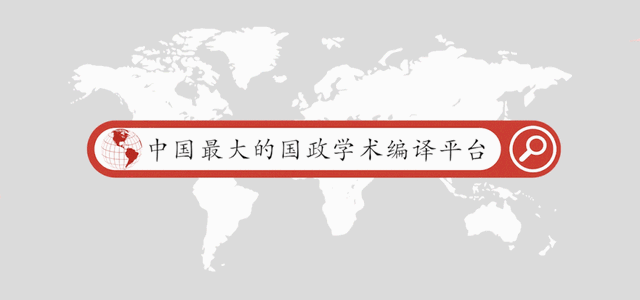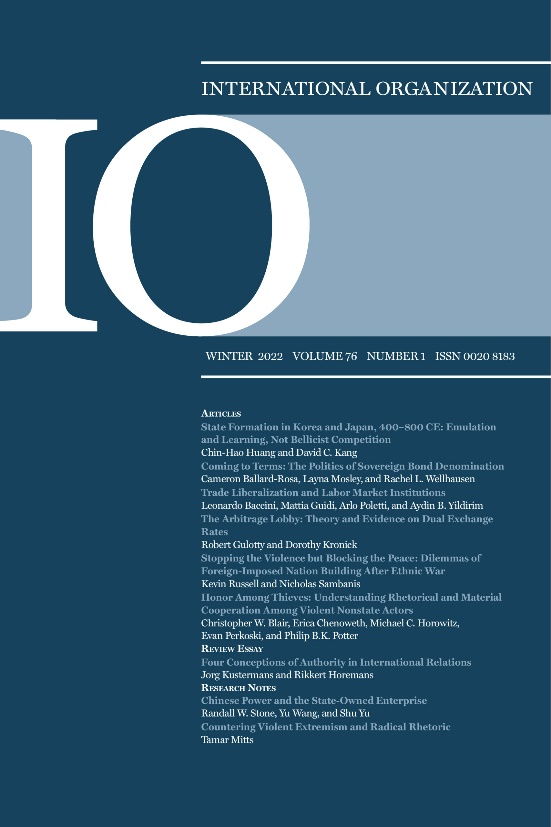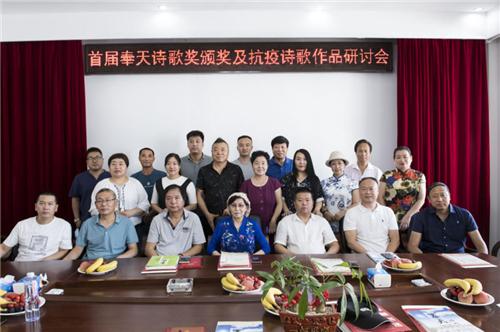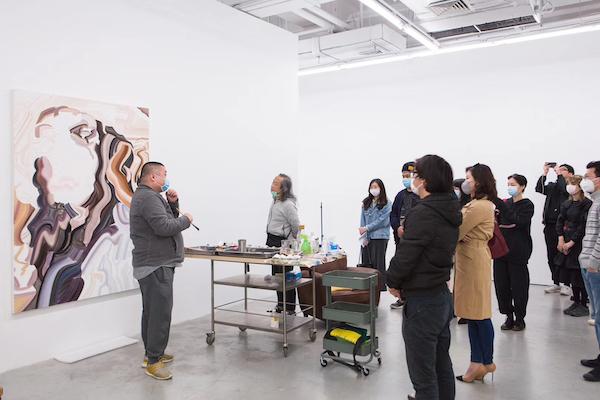「新刊速递」《国际组织》(IO), Vol. 76, No. 1, 2022 | 国政学人

期刊简介

《国际组织》(International Organization)是国际关系领域的一流学术期刊,也是多学科综合性学术期刊。本刊于1947年由英国剑桥大学出版社创立,内容来源广泛,集中探讨外交政策、国际关系研究、安全政策、国际政治经济以及欧洲一体化等热点议题。2020年期刊影响因子为6.27,在94个国际关系类刊物中排名第4。
本期目录
1. 韩国和日本的国家形成(公元400-800年):模仿和学习,而非出于好战的竞争
State Formation in Korea and Japan, 400–800 CE: Emulation and Learning, Not Bellicist Competition
2. 谈条件:主权债券定价的政治
Coming to Terms: The Politics of Sovereign Bond Denomination
3. 贸易自由化和劳动力市场机构
Trade liberalization and labor market institutions
4. 套利游说者:双重汇率的理论与证据
The Arbitrage Lobby: Theory and Evidence on Dual Exchange Rates
5. 停止了暴力,也阻碍了和平:种族战争后国外势力重建国家的困境
Stopping the Violence but Blocking the Peace: Dilemmas of Foreign-Imposed Nation Building After Ethnic War
6. 盗亦有道:理解非国家暴力行为体之间的修辞与物质合作
Honor Among Thieves: Understanding Rhetorical and Material Cooperation Among Violent Nonstate Actors
01
韩国和日本的国家形成(公元400-800年):模仿和学习,而非出于好战的竞争
题目:State Formation in Korea and Japan, 400–800 CE: Emulation and Learning, Not Bellicist Competition
作者:Chin-Hao Huang,耶鲁-新加坡国立大学学院政治科学系助理教授;David C. Kang,南加州大学国际关系与贸易教授。
摘要:在韩国和日本,国家的形成比欧洲早了1000年。日韩国家的形成是出于模仿和学习的原因,而不是出于好战的竞争意识。在历史上的东亚地区,国家形成于一个战争相对罕见的霸权体系下,而不是在一个威胁经常存在的均势体系下形成的。韩国和日本在公元5世纪到9世纪之间以国家的形态登上历史舞台,并在此后的几个世纪中以中央集权制的形式存在。这种中央集权由领土和行政能力界定,向其百姓征税,部署大规模军队,并提供广泛的公共产品。他们建立这些制度不是为了发动战争或镇压叛乱,因为在日本和韩国曾长时间掌权的众多王朝证明了他们所在地区的和平和内部的稳定。更确切地说,韩国和日本是通过模仿和学习中国,发展了自身的国家机构。两国的精英阶层出于权威声望和国内政权合法性的原因,在朝廷和贵族之间的竞争过程中复制了中华文明。
State formation occurred in Korea and Japan 1,000 years before it did in Europe, and it occurred for reasons of emulation and learning, not bellicist competition. State formation in historical East Asia occurred under a hegemonic system in which war was relatively rare, not under a balance-of-power system with regular existential threats. Korea and Japan emerged as states between the fifth and ninth centuries CE and existed for centuries thereafter with centralized bureaucratic control defined over territory and administrative capacity to tax their populations, field large militaries, and provide extensive public goods. They created these institutions not to wage war or suppress revolt: the longevity of dynasties in these countries is evidence of both the peacefulness of their region and their internal stability. Rather, Korea and Japan developed state institutions through emulation and learning from China. The elites of both copied Chinese civilization for reasons of prestige and domestic legitimacy in the competition between the court and the nobility.
02
谈条件:主权债券定价的政治
题目:Coming to Terms: The Politics of Sovereign Bond Denomination
作者:Cameron Ballard-Rosa,北卡罗莱纳大学教堂山分校政治系副教授;Layna Mosley,普林斯顿大学政治系和威尔逊公共与国际事务学院教授;Rachel L. Wellhausen,得克萨斯大学奥斯汀分校政府系副教授。
摘要:政府与主权债券市场债权人进行战略互动:他们不仅要选择借钱的频率和金额,还要选择在什么条件下借钱。以本国货币还是外国货币计价债务是这些条件的一个关键部分。根据“原罪”逻辑,债权人对发展中国家政府以本国货币发行的债券没什么兴趣。我们的新数据包括1990年至2016年期间131个国家发行的债券及其在一级市场中的24万笔交易,但这些数据表明情况并非如此。本币计价债券已开始主导市场,尽管这些债券通常有较短的债券期限。我们认为,基于意识形态的政策偏好在这一意想不到的趋势中发挥了重要作用。其他条件相同的情况下,右翼政府将外币计价债券作为减轻货币风险的手段,从而降低借贷成本。相对地,左翼政府更看重本币计价债券的灵活性,并且可以更好地通过降低风险地货币机构和稳定的宏观经济来按照自己的偏好行事。我们发现了支持我们论点的证据,政府的左右之分与计价货币的种类之间有稳健且持久的关系。即便是在一个以本币计价的发展中国家主权债券已成为常态的市场中也是如此。
Governments interact strategically with sovereign bond market creditors: they make choices not only about how often and how much to borrow, but also under what terms. The denomination of debt, in domestic or foreign currency, is a critical part of these terms. The “original sin” logic has long predicted that creditors have little appetite for developing-country government debt issued in domestic currency. Our novel data, including bond issues by 131 countries in 240,000 primary market transactions between 1990 and 2016, suggest otherwise. Domestic-denominated bonds have come to dominate the market, although domestic-currency issuance often is accompanied by shorter bond maturities. We argue that ideologically rooted policy preferences play an important role in this unexpected trend in denomination. All else equal, right governments choose foreign denomination as a means of mitigating currency risk and thus minimizing borrowing costs. In contrast, left governments opt for the flexibility of domestic denomination, and they are better able to act on their preferences in the presence of risk-mitigating monetary institutions and macroeconomic stability. We find support for our argument that partisanship has a robust and enduring relationship with denomination outcomes, even in a marketplace in which domestic-denominated developing-country sovereign bonds have become the norm.
03
贸易自由化和劳动力市场机构
题目:Trade liberalization and labor market institutions
作者:Leonardo Baccini,麦吉尔大学政治学系国际政治经济学副教授;Mattia Guidi,锡耶纳大学社会、政治和认知科学系的政治学助理教授;Arlo Poletti,特伦托大学社会学和社会研究系国际政治经济学副教授;Aydin B. Yildirim,苏黎世联邦理工学院比较与国际研究中心博士后研究员。
摘要:尽管市场自由化对企业层面的分配影响已广为人知,但以往的研究对各国国内制度差异如何影响贸易开放结果的关注有限。我们认为,对工资增长设置上限的协调性工资谈判机构和创造大量高技能工人的国家补贴职业培训之间会产生劳动力市场摩擦。向上的工资刚性尤其有助于小型企业经受贸易自由化引发的日益激烈的竞争和劳动力成本增加。我们通过欧盟企业层面的数据集对这一假设进行检验。该数据集包括2003至 2014 年间超过八十万家制造业企业的数据。我们发现,对于生产性企业而言,其在自由市场经济中的贸易收益比在协调市场经济中高 20%。与之相对应,相较于自由市场经济,低生产力企业在协调市场经济中遭受的收入损失要小得多。研究显示,与自由市场经济相比,制度化工资上限的存在和获得补贴的职业培训在协调的市场经济中是减少非生产性公司向生产性公司重新分配收入的关键机制。与我们的理论相一致的是,我们发现自由化行业的工资和就业在两种类型的劳动力市场上有不同的增长。最后,本研究暗示性地证明贸易自由化在不同劳动力市场的个人层面引发了对再分配的不同需求,这与我们的企业层面分析一致。
While the firm-level distributional consequences of market liberalization are well understood, previous studies have paid only limited attention to how variations in domestic institutions across countries affect the winners and losers from opening up to trade. We argue that the presence of coordinated wage-bargaining institutions, which impose a ceiling on wage increases, and state-subsidized vocational training, which creates a large supply of highly skilled workers, generate labor market frictions. Upward wage rigidity, in particular, helps smaller firms weather the rising competition and increasing labor costs triggered by trade liberalization. We test this hypothesis using a firm-level data set of European Union countries, which includes more than 800,000 manufacturing firms between 2003 and 2014. We find that, for productive firms, gains from trade are 20 percent larger in countries with liberal market economies than they are in coordinated market economies. Symmetrically, less productive firms in coordinated market economies experience significantly smaller revenue losses compared to liberal market economies. We show that both the presence of an institutionalized wage ceiling and the availability of subsidized vocational training are key mechanisms for reducing the reallocation of revenue from unproductive to productive firms in coordinated market economies compared to liberal market economies. In line with our theory, we find that wages and employment in liberalized industries increase differentially across both types of labor markets. Finally, we provide suggestive evidence that trade liberalization triggers a differential demand for redistribution at the individual level across different labor markets, which is in line with our firm-level analysis.
04
套利游说者:双重汇率的理论与证据
题目:The Arbitrage Lobby: Theory and Evidence on Dual Exchange Rates
作者:Robert Gulotty,芝加哥大学助理教授;Dorothy Kronick,宾夕法尼亚大学助理教授。
摘要:贸易政治研究领域的基本理论强调消费者福利和保护主义游说集团之间的冲突,但这些理论忽略了其他能够影响贸易政策的强大游说集团。本文提出了一个由消费者福利和进口商游说集团间冲突引起贸易扭曲的理论,采用委内瑞拉的原始数据,估算该模型的关键参数——政府对福利的重视程度。在委内瑞拉,乌戈·查韦斯(Hugo Chávez)使用一种汇率补贴,承销了数千亿美元的进口商品。传统模型的分析会使查韦斯看起来像一个福利最大化者,但我们的研究结果表明,他实际上是为了获取特殊利益才采取了扭曲的商业政策。我们的分析强调了调整主力模型以解释利益集团构造差异的重要性。贸易政策的政治不能简化为保护主义的政治。
Foundational theories of trade politics emphasize a conflict between consumer welfare and protectionist lobbies. But these theories ignore other powerful lobbies that also shape trade policy. We propose a theory of trade distortion arising from conflict between consumer welfare and importer lobbies. We estimate the key parameter of the model—the government’s weight on welfare—using original data from Venezuela, where Hugo Chávez used an exchange-rate subsidy to underwrite hundreds of billions of dollars of imports. Whereas estimates from traditional models would make Chávez look like a welfare maximizer, our results indicate that he implemented distortionary commercial policy to the benefit of special interests. Our analysis underscores the importance of tailoring workhorse models to account for differences in interest group configuration. The politics of trade policy is not reducible to the politics of protectionism.
05
停止了暴力,也阻碍了和平:种族战争后国外势力重建国家的困境
题目:Stopping the Violence but Blocking the Peace: Dilemmas of Foreign-Imposed Nation Building After Ethnic War
作者:Kevin Russell,独立学者;Nicholas Sambanis,宾夕法尼亚大学政治学系教授。
摘要:国外势力能否在种族-宗派战争后完成国家重建?本文通过和平实现的实证理论框架证明,即使在资源充足且措施公平的条件下,通过国外势力干预重建国家的可能性依然不大。“宗派”困境的出现是因为和平的实现必须依靠当地领导人,但通过民族-宗派冲突赢得声誉的领导人没有停止打民族牌的动机,也不会提供公共物品。如果国外势力能够停止种族暴力并重建国家机构,那么“宗派”困境就会改变。但如果国外势力排挤当地领导人、削弱国家合法性,阻碍国家建设,就会催生“体制”困境。由国外主导的国家重建最终会遭遇失败,这是因为随着国家重建的进行,种族认同逐渐转向国家认同,由此产生的“主权”困境,会迫使国外势力停止插手国内事务。如果干预在统一民族主义产生之前结束,国内暴乱可能会再次发生。本文基于外界势力的类型、当地政治发展和外界势力的身份,提供了反映这三个困境的“诊断”。在决定是否由国外势力插手时,应该根据暴力持续的可能性和代价,权衡建设自我实现和平的限度。
Can third parties build nations after ethno-sectarian war? We provide a positive theory of peace building that highlights trade-offs that are inherent in any foreign intervention, narrowing the conditions for success even when interventions are well resourced and even-handed. A “sectarian” dilemma arises because peace must rely on local leaders, but leaders who earned their reputations through ethno-sectarian conflict have no incentive to stop playing the ethnic card and will not provide public goods. Intervention can shift those incentives if it stops ethnic violence and rebuilds state institutions. But an “institutional” dilemma arises if intervention crowds out local leaders, limiting state legitimacy and constraining the pace with which state building unfolds. The window for a lengthier, slower pace of foreign-led state building will close due to its own success as the population switches from ethnic to national identification, creating a “sovereignty” dilemma that pushes third parties out. If intervention ends before institutions can deepen leader incentives for a unifying nationalism, violence will likely recur. We provide an “intervention diagnostic” that reflects these three dilemmas, which are a function of the type of intervention, local political development, and the identity of the intervener. In deciding whether to intervene, the limits of building self-enforcing peace should be weighed against the likelihood and costs of ongoing violence.
06
盗亦有道:理解非国家暴力行为体之间的修辞与物质合作
题目:Honor Among Thieves: Understanding Rhetorical and Material Cooperation Among Violent Nonstate Actors
作者:Christopher W. Blair,宾夕法尼亚大学政治学系博士;Erica Chenoweth,哈佛大学肯尼迪学院教授;Michael C. Horowitz,宾夕法尼亚大学政治学教授;Evan Perkoski,康涅狄格大学政治学助理教授;Philip B.K. Potter;弗吉尼亚大学政治学副教授。
摘要:激进组织之间的合作有助于提高能力,但也存在安全风险,尤其是当组织面临来自国家的大量镇压时。因此,即使背叛动机很强烈,激进组织要让合作在最有价值的时候出现并维持下去,就必须想办法承诺合作。我们假设,共同的意识形态通过提供社区监控、权威结构、信任和跨国网络来发挥这一作用。我们使用1950年至2016年间激进组织之间关系新的、广泛的时间序列数据来测试这一理论。我们发现,当群体共享一种意识形态,尤其是一种宗教信仰时,他们更有可能在面对国家镇压时维持物质合作。这些发现在研究表明非国家暴力行为体之间的联系强烈地塑造了他们的战术和战略行为的背景下展开。
Cooperation among militant organizations contributes to capability but also presents security risks. This is particularly the case when organizations face substantial repression from the state. As a consequence, for cooperation to emerge and persist when it is most valuable, militant groups must have means of committing to cooperation even when the incentives to defect are high. We posit that shared ideology plays this role by providing community monitoring, authority structures, trust, and transnational networks. We test this theory using new, expansive, time-series data on relationships between militant organizations from 1950 to 2016, which we introduce here. We find that when groups share an ideology, and especially a religion, they are more likely to sustain material cooperation in the face of state repression. These findings contextualize and expand upon research demonstrating that connections between violent nonstate actors strongly shape their tactical and strategic behavior.
编译 | 李思 徐一凡 王芷汀 戎秦婴 程朵依 吕紫烟
审校 | 邵良 姚寰宇 李博轩 黄慧彬 杨沛鑫 卫艺璇
排版 | 任航奇 彭凌懿
文章观点不代表本平台观点,本平台评译分享的文章均出于专业学习之用, 不以任何盈利为目的,内容主要呈现对原文的介绍,原文内容请通过各高校购买的数据库自行下载。





















评论